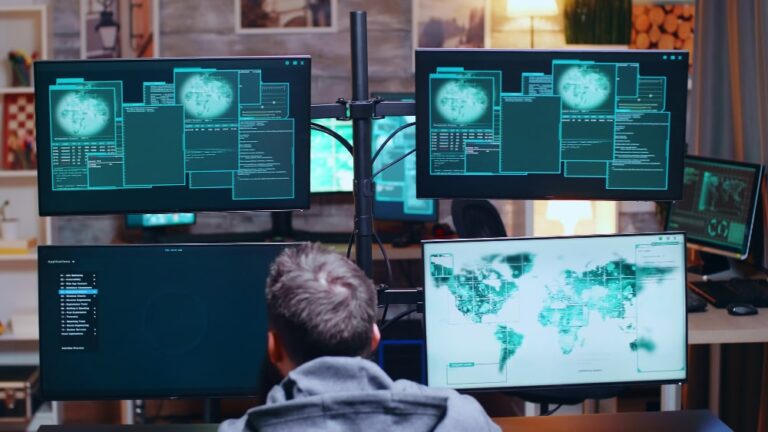Technology has always been like a superhero for various industries including healthcare. It has revolutionised the way the hospital operates, making processes more efficient and enabling better patient care. However, with great power comes great responsibility, especially when it comes to handling sensitive health data. In today’s digital world, hospitals store vast amounts of personal health information electronically, including medical records, test results, prescriptions, and many more. Managing and protecting this data is of the utmost importance to maintain patient privacy and confidentiality. That’s where healthcare IT support teams play a vital role.
On this page, we’ll dive into why hospitals need IT support teams to manage and protect our health information.
Why healthcare industries must have an IT support team?
The healthcare industry relies on IT support technicians to keep things running smoothly by maintaining computer systems and networks. It helps to manage electronic health records and ensure that the patient information is safe, secure and accessible. Whenever there is a tech issue, ensure that problems get fixed quickly. With their expertise, hospital management staff can focus on providing the best care instead of worrying about tech stuff. We can say that IT support teams are like the backbone of the healthcare centre, keeping everything tech-related in tip-top shape.
Roles and Responsibilities of IT Support Teams in Healthcare Organisations
The main role of the IT service team is to maintain, support, manage and secure the data of certain organisations. Their specific roles and responsibilities are discussed below:
1. Electronic Health Records (EHR) management
Before the use of technology, hospitals used to store their data manually. Now with the help of IT support services, healthcare organisations use EHR, an electronic version of patient medical history that is stored, managed and maintained by the provider over time. Those data can be shared across different healthcare system providers safely and securely. The use of paper also reduces and minimises the errors that ensure the patient data is accurate and up-to-date.
2. Remote patient monitoring and telemedicine
Healthcare providers monitor patients in real time by using various types of medical devices such as wearable sensors, blood pressure monitors, glucose meters, and many more. Similarly, telemedicine solutions enable patients to consult with healthcare professionals virtually which improves access to care, especially for individuals living in remote or underserved areas. Here, the IT support team assist healthcare providers in setting up remote sensing devices and video conferencing platforms and securing data transmission. They also troubleshoot connectivity issues and ensure data privacy and security during remote consultations.
3. Improve patient care
Electronic Health Records provide access to records, history of medical and test results of a patient while the telemedicine platform enables remote patient consultation. However, when the technology systems do not function correctly, it causes delays, errors, and miscommunication, which negatively impacts patient satisfaction. Technical issues are ensured to be resolved quickly and operate optimally through efficient technology so that healthcare workers can focus on providing care to patients.
4. Enhance security
Sensitive data of patients are secured through the enhancement of robust cybersecurity including protection against unauthorised access, malware infections, data breaches and cyberattacks. The protection of patient privacy and compliance with regulations such as HIPAA (also known as the Private Act 1988) are ensured. By staying updated with the latest security trends and technologies, they safeguard their clients against the most recent threats.
5. Resolve technical issues fast and increase productivity
Skilled technical IT experts can diagnose and resolve technical problems quickly to prevent technical problems such as software glitches and printer malfunctions from occurring in the first place. To implement proactive measures, software updates, troubleshooting, security patches and regular system maintenance are used as resources that reduce downtime and increase the productivity level. That’s how hospital staff can focus on providing the best quality care to their patients.
6. Seamless integration and migration of new technologies
In the organisation of healthcare, the expertise of the IT service team implements the new technologies and seamlessly integrates them into the existing systems. In other words, they can help organisations of healthcare to invest in the right technologies to meet their specific needs.
7. Proactive maintenance and monitoring to prevent technical problems
Monitoring and maintenance of the technology systems can secure and protect against potential threats as well as function optimally. Therefore, the IT service team try to identify the potential issues before they become a problem, allowing them to resolve any technical issues before they have a significant impact.
8. Streamlined operations
In many healthcare organisations, administrative tasks like billing, scheduling appointments and managing inventory can be done with the help of IT support staff. This can reduce manual paperwork and human errors, enhancing operational effectiveness and resource allocation.
9. Precision medicine initiatives
To analyse the various data of the patient like genetics, medical history and lifestyle, an outsourced team of IT helps with precise medicine programs that make it easier for hospitals. Using this data, healthcare professionals can make treatment plans that are just for each person. These personalised plans make medical treatments work better as they are designed for the specific needs of each patient.
10. Predictive Modelling and data analysis
An experienced IT team assist healthcare workers in spotting patterns and trends by collecting and analysing large databases that facilitate proactive planning and allocate resources effectively. The use of predictive modeling helps in identifying new trends and developing protocols to enhance treatment, disease outbreaks, admission rates of patients and resource needs.
11. Assist technically
Healthcare professionals often encounter technology-related challenges in their day-to-day work. Whether it’s learning how to use a new software application or troubleshooting issues with medical devices, the service team is there to provide guidance and solutions by offering training sessions and on-demand support or creating friendly documentation to address any technical concerns. By doing so, they empower healthcare professionals to leverage technology effectively and deliver high-quality care.
12. Cost efficiency
The initial cost of an IT service team in the healthcare system is high, but the savings are large over time.
13. 24/7 support and fast response to technical issues
As we know, the healthcare industry works 24 hours without a pause. Therefore, a managed IT support team also ensures continuous support and fast response to address technical issues night and day, minimises downtime and ensures that it does not disrupt the care of patients.
Conclusion
IT support team is a must in the healthcare industry as they manage administrative tasks, EHR, troubleshoot computer issues, maintain networks, and provide technical assistance to healthcare professionals. Service expertise keeps everything running smoothly behind the scenes, allowing healthcare professionals like doctors and nurses to focus on providing the best care to patients.










